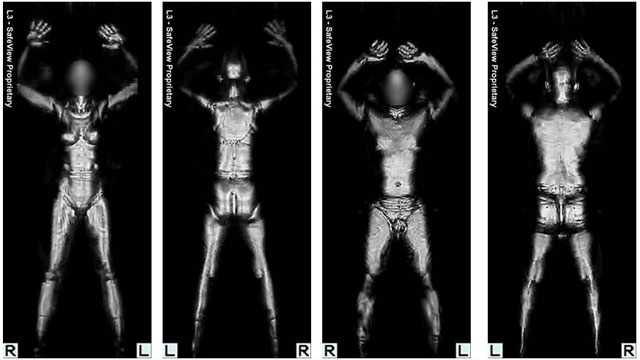TSA violated law when installing full body scanners, court says

It's a strange feeling, these new full-body airport scanners.
You step forward, having been randomly selected from the line of passengers, unsure of what's going to happen if you haven't gone through the process before.
You step into the large circular machine and raise your arms like you're being held up at gunpoint. (The irony.) The massive machine hums, and a camera spins on each side of you. You try not to move a muscle.
The TSA guard motions toward you, you drop your hands and you're on your way to collect your things at the other end of the x-ray machine.
And now it's illegal -- at least for now.
The U.S. Transportation Security Agency violated federal law when it installed full-body scanners in American airports because it failed to follow proper procedures, a federal appeals court ruled on Friday.
But it's not the controversial scanners themselves that fell on the wrong side of the law -- rather, it was the TSA's installation of them.
The Circuit Court of Appeals in Washington, D.C. said the agency was not exempt from laws that require federal agencies to first notify the public and seek comment.
Because the scanners produce an image of an unclothed passenger, the court found them more intrusive of personal privacy than magnetometers -- the "wands" agents wave over passengers' clothed bodies -- and thus required different procedure.
The lawsuit was first filed by the Electronic Privacy Information Center, an advocacy group, in July 2010, arguing that the TSA acted unilaterally in making them a primary screening technique in domestic airports, violating the Administrative Procedure Act, which stipulates that an interested person has the right to petition -- and a response -- for the issuance, amendment or repeal of a rule.
The group filed a petition in 2009 with no luck.
In EPIC's November 2010 opening remarks, the group argued that the Department of Homeland Security "initiated the most sweeping, the most invasive, and the most unaccountable suspicionless search of American travelers in history," adding that the TSA "must comply with relevant law, and it must not be permitted to engage in such a fundamental change in agency practice without providing the public the opportunity to express its views."
As you might expect, EPIC also argues that the machines themselves violate privacy laws.
In today's decision, it's clear that the court finds them more intrusive, but the question remains: are they intrusive enough to warrant further restriction?
Editor's note: The original headline of this post indicated that the TSA must halt using the scanners; that is incorrect. Moving forward, it merely must act consistent with the court's ruling. We regret the error.
